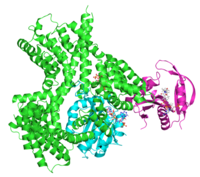
Back الهرمون الموجه لقشر الكظرية Arabic Адренокортикотропен хормон Bulgarian অ্যাড্রেনোকোর্টিকোট্রপিক হরমোন Bengali/Bangla Adrenokortikotropni hormon BS Corticotropina Catalan Adrenokortikotropní hormon Czech Adrenokortikotropt hormon Danish Adrenocorticotropin German އެޑްރީނޯ ކޯޓިކޯ ޓްރޮޕިކް ހޯރމޯން DV Αδρενοκορτικοτρόπος ορμόνη Greek
| pro-opiomelanocortin | |||||||
|---|---|---|---|---|---|---|---|
 | |||||||
| Identifiers | |||||||
| Symbol | OMC | ||||||
| NCBI gene | 5443 | ||||||
| HGNC | 9201 | ||||||
| OMIM | 176830 | ||||||
| RefSeq | NM_000939 | ||||||
| UniProt | P01189 | ||||||
| Other data | |||||||
| Locus | Chr. 2 p23 | ||||||
| |||||||
Adrenocorticotropic hormone (ACTH; also adrenocorticotropin, corticotropin) is a polypeptide tropic hormone produced by and secreted by the anterior pituitary gland.[1] It is also used as a medication and diagnostic agent. ACTH is an important component of the hypothalamic-pituitary-adrenal axis and is often produced in response to biological stress (along with its precursor corticotropin-releasing hormone from the hypothalamus). Its principal effects are increased production and release of cortisol and androgens by the zona fasiculata and zona reticularis, respectively. ACTH is also related to the circadian rhythm in many organisms.[2]
Deficiency of ACTH is an indicator of secondary adrenal insufficiency (suppressed production of ACTH due to an impairment of the pituitary gland or hypothalamus, cf. hypopituitarism) or tertiary adrenal insufficiency (disease of the hypothalamus, with a decrease in the release of corticotropin releasing hormone (CRH)). Conversely, chronically elevated ACTH levels occur in primary adrenal insufficiency (e.g. Addison's disease) when adrenal gland production of cortisol is chronically deficient. In Cushing's disease a pituitary tumor is the cause of elevated ACTH (from the anterior pituitary) and an excess of cortisol (hypercortisolism) – this constellation of signs and symptoms is known as Cushing's syndrome.
- ^ Morton IK, Hall JM (December 6, 2012). Concise Dictionary of Pharmacological Agents: Properties and Synonyms. Springer Science & Business Media. pp. 84–. ISBN 978-94-011-4439-1.
- ^ Dibner C, Schibler U, Albrecht U (2010). "The mammalian circadian timing system: organization and coordination of central and peripheral clocks" (PDF). Annual Review of Physiology. 72: 517–49. doi:10.1146/annurev-physiol-021909-135821. PMID 20148687. Archived (PDF) from the original on April 4, 2023. Retrieved June 28, 2019.